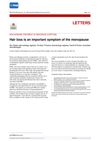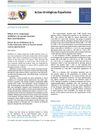Search
for
Sort by
Research
210-240 / 1000+ resultsresearch Efficacy and Safety of Combined Microneedling Therapy for Androgenic Alopecia: A Systematic Review and Meta-Analysis of Randomized Clinical Trials

research Do 5α-Reductase Inhibitors Raise Circulating Serum Testosterone Levels? A Comprehensive Review and Meta-Analysis Explaining Paradoxical Results
5α-Reductase inhibitors do not consistently increase testosterone levels in the blood.

research Possible Association Between Androgenic Alopecia and Risk of Prostate Cancer and Testicular Germ Cell Tumor: A Systematic Review and Meta-Analysis
Baldness, especially at the front, may lower the risk of testicular cancer by 31%, but its link to prostate cancer is unclear.
research Relative Efficacy of Minoxidil and 5-Alpha-Reductase Inhibitors in the Treatment of Male Androgenetic Alopecia: Protocol for a Network Meta-Analysis Study
research Association Between Androgenetic Alopecia and Risk of Cardiovascular Events in Young Males: A Systematic Review and Meta-Analysis
research The Efficacy of Placebo in Clinical Trials of Topical Minoxidil for Androgenetic Alopecia: A Systematic Review and Meta-Analysis

research Relationship of Dietary Intake of Omega-3 and Omega-6 Fatty Acids with Risk of Prostate Cancer Development: A Meta-Analysis of Prospective Studies and Review of Literature
Eating more omega-3 and less omega-6 fatty acids may lower the risk of developing prostate cancer.
research The Efficacy and Safety of Dutasteride Compared with Finasteride in Treating Men with Androgenetic Alopecia: A Systematic Review and Meta-Analysis

research Possible Association Between Androgenic Alopecia and Risk of Prostate Cancer and Testicular Germ Cell Tumor: A Systematic Review and Meta-Analysis
There might be a link between male pattern baldness and a higher risk of prostate cancer and testicular cancer.

research Clinical Efficacy and Safety of Kanglaite Injection, Adjuvant Gemcitabine and Cisplatin Chemotherapy for Advanced Non-Small-Cell Lung Cancer: A Systematic Review and Meta-Analysis
Kanglaite injection with chemotherapy improves treatment and reduces side effects for advanced lung cancer.
research Do Pleiotropic Effects of Spironolactone in Women With PCOS Make It More Than an Anti-Androgen? Evidence From a Systematic Review and Meta-Analysis
Spironolactone is effective for idiopathic hirsutism but has limited effects on other PCOS symptoms.

research Addressing Continuous Data for Participants Excluded from Trial Analysis: A Guide for Systematic Reviewers
The conclusion is that the risk of losing significance in meta-analysis results increases with smaller effects and more missing data, and using the median standard deviation for imputation is recommended.

research Analysis of Data From Breast Diseases Treated With 5-Alpha Reductase Inhibitors for Benign Prostatic Hyperplasia
Medicines for enlarged prostate may raise the risk of breast growth and tenderness but not breast cancer.

research The Relative Efficacy of Monotherapy With Janus Kinase Inhibitors, Dupilumab and Apremilast in Adults With Alopecia Areata: Network Meta-Analyses of Clinical Trials
JAK inhibitors are more effective and safer for treating alopecia areata than dupilumab and apremilast.
research Efficacy Comparison of Monotherapies and Combination Therapies for Androgenetic Alopecia: A Bayesian Network Meta-Analysis
Combination therapies are more effective for treating androgenetic alopecia than single treatments.

research Toxoplasma Gondii Infection and Testosterone Alteration: A Systematic Review and Meta-Analyses
Toxoplasma gondii infection may increase testosterone levels in males.

research Multi-Trait Analysis of GWAS: Perceived Youthfulness in the UK Biobank
The conclusion is that certain traits, including perceived facial aging and BMI, are linked to perceived youthfulness differently in men and women.

research Multi-Trait Analysis of GWAS: Perceived Youthfulness in the UK Biobank
The conclusion is that certain traits, including perceived facial aging and BMI, are linked to how youthful people look, with some differences between males and females.

research Efficacy of Non-Surgical Treatments for Androgenetic Alopecia in Men and Women: A Systematic Review with Network Meta-Analyses and an Assessment of Evidence Quality
Minoxidil and finasteride work best for hair loss; more research needed.

research Ethnicity, Obesity, and the Prevalence of Impaired Glucose Tolerance and Type 2 Diabetes in PCOS: A Systematic Review and Meta-Regression
Women with PCOS are more likely to have impaired glucose tolerance and type 2 diabetes, especially if they are Asian or obese.

research Skin Diseases Associated With Atopic Dermatitis
People with atopic dermatitis are more likely to develop other skin conditions due to shared genetics and immune pathways.

research Hair Loss Is an Important Symptom of Menopause
Many women experience significant hair loss during menopause, and topical minoxidil is an effective treatment.

research Biotin: A Friend or Foe in Hair Loss
Biotin doesn't help hair growth in healthy people and can cause health risks if overused.

research Relationship Between Early-Onset Androgenetic Alopecia and Metabolic Syndrome: Systematic Review and Meta-Analysis
Early-onset male baldness is significantly linked to a higher risk of metabolic syndrome.
research Exploring The Historical Stigma Of Spironolactone Use In Breast Cancer Survivors With Alopecia
Spironolactone is safe for breast cancer survivors with alopecia and does not increase cancer risk.
research Controversies: Is Finasteride Safety Data Adequately Reported in Published Trials?
Finasteride safety data in trials may be underreported or misrepresented.

research Comment on 'Platelet-Rich Plasma and Its Utility in the Treatment of Acne Scars: A Systematic Review'
Platelet-rich plasma combined with other treatments improves acne scars better than those treatments alone.

research Effect of 5α-Reductase Inhibitors on Sexual Function: New Contributions
5-alpha reductase inhibitors increase the risk of sexual dysfunction in patients treating enlarged prostate but not in those treating hair loss.

research Dyslipidemia in Patients with Androgenetic Alopecia: Statins, Finasteride, or Both?
Alopecia patients have higher heart disease risk; statins and finasteride may help.